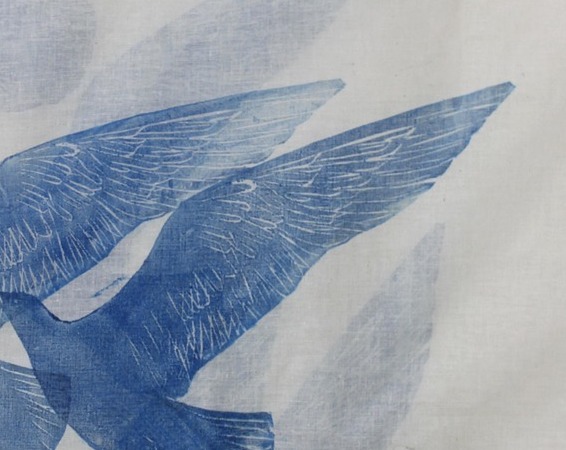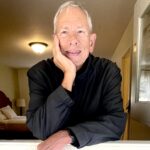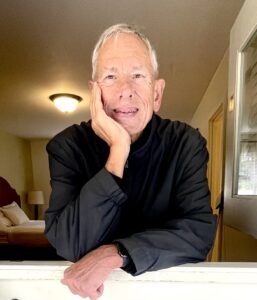Whenever I get six miles above the earth in an airplane, as I am now, I think about God, eternity, and the end—both the purpose and cessation—of all things. Looking down at the endless clouds below me, I think: God knows everything—every thing. So He must know every molecule of every cloud for as far as my eye can see, and then over the entire surface of this planet. And that’s only the most minuscule fraction of what God must know to know everything.
I cannot rise these miles above our planet on my twice-yearly snowbird trips between Illinois and Arizona without being reminded of a passage from Timothy Ferris’s great 1988 book, Coming of Age in the Milky Way Galaxy. The passage so shook me when I first read it 30 years ago that it became my first entry in a journal I call a Factbook that now runs to 156 single-spaced pages of amazing facts randomly encountered in my reading. But this very first entry—the entry that jarred me into creating this Factbook—remains the most amazing entry in all 30 years of keeping this journal. Ferris writes:
If we possessed an atlas of our galaxy that devoted but a single page to each star system, so that the sun and all its planets were crammed on one page, that atlas would run to more than 10 million volumes of 10,000 pages each. It would take a library the size of Harvard's to house the atlas, and merely to flip through it at the rate of one page per second would require over 10,000 years. . . . And there are 100 billion other galaxies.
And then Ferris tells us one more thing: “our solar system harbors fewer than one 10 billionth of the total number of planets that exist in our galaxy alone.” And then I remember that there are 100 billion other galaxies.
I remember how speck-like Ferris’s words made me feel the first time I read them, and every one of the countless times I have read them since then. But in fact I feel vastly less than a speck. There is no word for the smallness I actually am before such numbers in a universe that is almost 14 billion years old.
I wonder too at the miracle of my eyes witnessing these clouds. Such wonder comes every time I see a blind person or I’m in the examining room of a doctor with an eye display on his wall. Our eyes are miracles. I’m thinking those words as I look out at these clouds. And my words make me realize every cell of my entire body is a miracle, for every cell is alive—and not a single soul who has ever lived can explain how the first living cell came into life. It’s all miracle that I wonder about on my snowbird journeys.
I wonder too about my family and my deceased wife–where is she? I ache to be with her for eternity. I think of her and my family and all those I have loved and lost to death. In all this universe, where are they? How are they? Will I be with them again? For eternity? And how long is eternity? And where is eternity?
I am what might be described as a devout Catholic, but I have always wondered about that adjective, devout. When everything is stripped away–as everything indeed will one day be stripped away–what does devout mean? I believe it means that within the frailty of my being—my sinful, selfish being—I try, though not likely my best, to believe in and practice the faith I profess every Sunday in the Nicene Creed.
But despite such trying to believe, at some level beneath my trying is an abyss of darkness for which I have no name, only fear. And it is that fear I am aware of as I look out this plane window at a world so much vaster than vast and so much older than old that all the doctrines of the church fade into Sunday morning words. How I did not want to write that sentence! I am terrified of that sentence.
What I have wanted all my life is the very opposite of that sentence. I have wanted only to be loved, demonstrably loved, daily, hourly—by God, by my wives, by my children, by my mother and father, by a few friends, and to love all of them in return. And I have wanted to live in a world as innocent as my childhood, a world I long for whenever I watch How Green Was My Valley, The Keys to the Kingdom, and It’s a Wonderful Life, a world where a good man causes goodness to bloom in those around him.
I think of all this as I fly over hills that have no color I can put a name to. I wonder about the color of these hills every time I fly to or from Sun City. What color is this land below me? I have no name for the color of so much of this land. Some of it is green, but so vague it is a shame to call it by that name. And the hills are a color I cannot even name.
And I think how little time I have left on this planet and how I don’t know where I’ll be going when this body ceases to breathe air. My remains will go to a cemetery on Milwaukee Avenue. I have already paid for the plot and for the gravestone that will mark the plot where my remains and the ashes of my beloved second wife Kathy will be laid to rest—but what does rest mean? I designed that gravestone ever so carefully, though I know full well that after my family attends my interment, they will return only a few times. After a few years not a single soul will ever visit again. The design of my gravestone will matter not a whit.
Remains. What a word. Lifeless flesh. Lifeless bones. Remains. Reminders of the living beings we once were who moved about on this earth and strove to love and be loved.
Remains. Reminders for the few minutes anyone looks upon them after the life has gone out of them.
How much time do we spend looking at those who have ceased to breathe? That’s a real–not a rhetorical–question. How much time do we actually spend looking at the dead person we spent decades so dearly loving?
The person I looked at the longest of all after death was my second wife Kathy who died in front of me. I sobbed as I looked at her body right next to mine for three hours before the men in blue uniforms from the crematorium came to take her away. They brought in a narrow table on wheels to put her on, then asked us to leave the room while they moved her to this table. We did not ask why we had to leave the room. We just went into the kitchen and a few minutes later they rolled the narrow table out the front door. And I never saw my sweetheart again.
Three hours with my sweetheart seems now a terribly short time with her remains, but I know of no one who has spent even close to that much time looking directly at the remains of someone dearly loved. I spent less than two minutes looking at the two pounds three-and-a-half ounces of our first child who died the same day she was born. I spent only a few minutes looking at what funeral directors gave us of my mother and father. My mother hovered in my life for 40 years and my father for 53 years, and I spent less than 15 minutes looking at their remains, and those minutes were spread over a period of two evenings in funeral homes with constant interruptions. I never got to see the corpse of my grandson D. J. who was run over by a train. “You would not want to view the remains,” the policemen said at my son’s front door at two in the morning ten years ago. And so we never did. Without knowing our last view of him would be our last view ever, with no warning whatsoever, he just disappeared, and we never saw him again.
As we fly over this land now shot across with the long edge light of evening, I also consider this life I have lived for 84 years: what I have done with what God has given me. I didn’t do it alone, of course. I was given a great country and a great time in the life of that country, both of which made it possible for me to do what I have done. Had I been born into another time and country—say, eighteenth century China—I should very likely have had a short, brutish life of nil accomplishment and an enormous amount of suffering before becoming at a young age “remains” no one would remember. But I was born into America in the middle of the twentieth century. In all the centuries mankind has occupied this planet, that was the very best luck one could have.
And so after five years working in a printing plant that my father required me to work in and turning in three-fourths of my pay to him and not having three dimes to rub together, I faced my father under a fluorescent light in our kitchen and told him I did not want to do work for which I had no aptitude and great loathing. I begged him to let me live at home without paying room and board while I went to college locally.
And he allowed me.
And from that single decision the rest of my life has sprung. I not only got an education—which is a pitifully weak way of expressing all the reading and writing and listening and looking and remembering and thinking one has to do—but in doing it I developed an insatiable thirst to keep on learning, to keep on reading as many books as I could, and to read them as closely as I could, and read them with joy and passion.
In 1966 I was blessed to marry a good and beautiful woman by whom I fathered four children before our marriage failed in 1975, mostly through my fault. My sons from that marriage have gone on to lead esteemed lives and become fathers to ten children. My second wife, whom I married in 1979, was also good and beautiful. But our marriage failed because of difficulties managing a blended family. After 14 years of not seeing each other, her sweetness and kindness brought us back together in 1994, and from then until her death with Alzheimer’s in 2015, I was heels-over-head in love and we were inseparable.
And I was so very fortunate to teach English for thirty-six years in the City Colleges of Chicago, where I had myself been a part-time student for five-and-a-half years while I worked in a printing plant. Such a way of earning a living wasn’t even the faintest gleam of a dream a few years earlier.
And money I invested in stocks and funds increased by a factor of fifteen. Even now, sitting on this plane, looking out at land whose color I cannot name, I am beyond amazed at my good fortune. When I was a young man, I did not have three dimes to rub together. How did all this come to me?
But six miles above the earth, flying into the setting sun, I know so well how temporary is the money. What matters is my family and my wife who has been gone now nearly ten years and a few dear friends and my work trying to find truth and beauty in my writing.
All these miracles and treasures and gifts will soon be gone from my life—or rather, I from them. We will part ways—as all eight billion of us on this planet will part ways with all we have learned and earned and witnessed and loved. Our remains will anonymously join the molecules I am flying over, the endless universe God has flung into being.
And where in that endless universe is heaven and where is eternity and where are my dearly loved ones who have left the here and now for somewhere else?
Only when I am nowhere at all, a snowbird between places, flying into a sliver of light on the horizon, do I question God and the universe so acutely. And I know no answer will come my way till I am remains.
Image via Pixabay.






